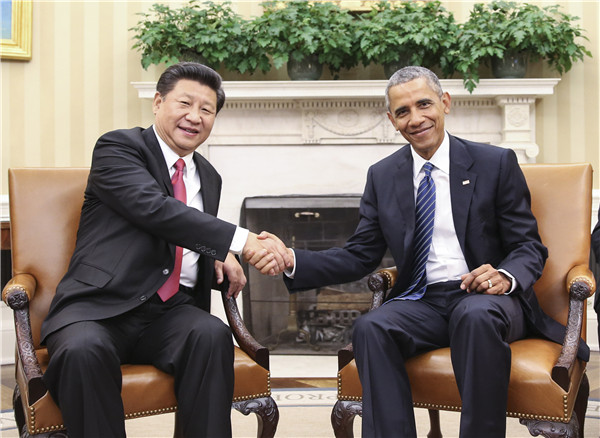Consensus on 'What to do' & 'What not to do'
- By Shen Dingli
 0 Comment(s)
0 Comment(s) Print
Print E-mail China.org.cn, October 19, 2015
E-mail China.org.cn, October 19, 2015
|
|
|
Chinese President Xi Jinping (L) shakes hands with U.S. President Barack Obama (R) during their talks in Washington D.C., the United States, Sept. 25, 2015. (Xinhua/Lan Hongguang) |
Chinese President Xi Jinping's state visit to the United States in late September was a crucial visit made at a crucial moment.
The moment is defined as crucial because it was at that time that the US became overly worried about the pressure brought by China's fast growth in the past thirty-odd years and found it difficult to interpret Beijing's increasingly assertive diplomacy. The visit is defined as crucial because it was at such a critical moment that the Chinese head of state voluntarily delivered answers to those doubts and misgivings to the White House. Xi's visit was aimed at removing obstacles in the development of Sino-US relations and preventing the bilateral ties from falling into the Thucydides Trap.
In most senses, that goal has been attained. Previously, China and the US were wide apart on the issues of maritime safety and cyber security. In the South China Sea, the two sides bickered fiercely over American warships' and aircraft's reconnaissance moves and China's construction projects on some islands and reefs. In terms of Internet safety, both countries are victims of cyber attacks but differed on whether the attacks were from one another and on how they could cooperate to prevent such attacks. The gap even grew wider after the June 2013 Sunnylands summit between Xi and US President Barack Obama. The Cyber Security Work Group both sides set up after the summit had not been able to work normally.
These troubles were partly remedied during Xi's latest visit.
At the Sunnylands summit, the two presidents reached a consensus on reducing the possibility of military accidents by early notification of major military operations and establishing guidelines of behavior on naval and air military encounters. Later the two countries' defense departments developed communication and cooperation for establishing the two "mechanisms of mutual trust" and clinched two memoranda of understanding on the mechanisms before the two presidents met for the Zhongnanhai, Beijing summit last November.
Prior to the latest summit in Washington DC, both countries signed a "military crisis notification" annex to the agreement on early notification of major military operations and an "air military encounter" annex to the behavior guidelines on naval and air military encounters. All these moves were the results of the virtuous interaction promoted by the three summits for enhancing mutual trust, avoiding misunderstanding and preventing risks and crises in international air and maritime areas. With regard to China's construction work on South China Sea islands and reefs, China told the US during the latest summit that the moves were not targeted at any country.
China and the US have been squabbling over the issue of cyber safety, with both sides being victims of cyber-attacks but blaming each other as the culprit. As the attacks are difficult to track, those blames can hardly be verified, much less proven through cooperation. Former US intelligence employee Edward Snowden exposed the facts of the National Security Agency exercising web monitoring over many other countries, triggering global condemnation of the US. Washington, however, repeatedly accused China groundlessly for alleged cyber-attacks against the US. The Americans' attitude made it difficult for the two countries to carry out effective cooperation on the issue.







Go to Forum >>0 Comment(s)